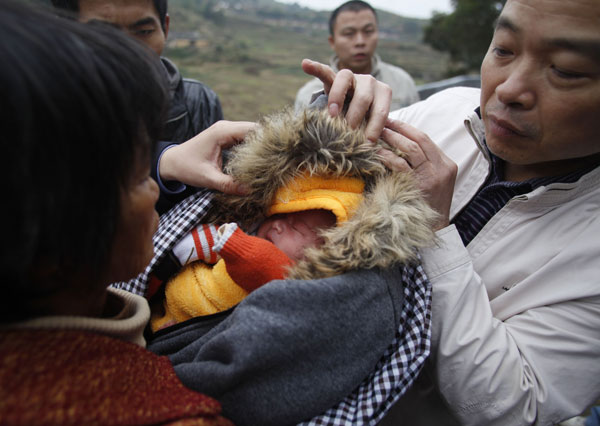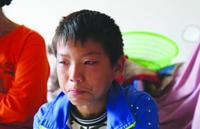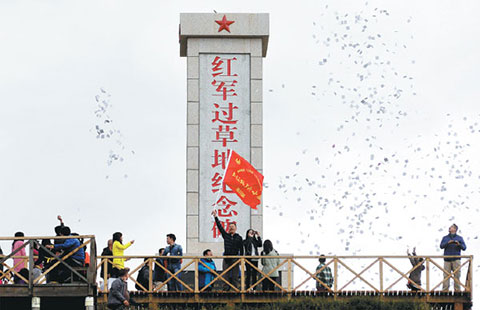Harsher punishments will not stop trade in children
By CAO YIN (China Daily) Updated: 2013-01-22 04:11Levying heavy punishments on families that adopt abducted children, as a top public security official has suggested, is unlikely to solve the problem of human trafficking, according to legal experts.
Chen Shiqu, director of the human trafficking taskforce at the Ministry of Public Security, had argued that the rampant black market for babies should be tackled at its root, by targeting the families that adopt the children.
 |
|
A woman holding a baby boy she bought from child traffi ckers is stopped by plainclothes police officers in Anxi county, Quanzhou, Fujian province, in December. Public security authorities rescued 89 abducted children and arrested 355 suspects in a nationwide crackdown on children traffi cking in December. [WANG SHEN / XINHUA] |
Writing on micro-blogging website Sina Weibo, Chen urged legislators to rewrite the Criminal Law to target childless couples driving demand. He said those who adopt an abducted child should face three to seven years in prison.
"The market (for illegal adoption) is like a tumor," he wrote in a post that was forwarded about 25,000 times.
People who abduct children can now face the death penalty, but those who buy them will receive at most three years behind bars.
But Zeng Xinhua, a criminal law researcher at Beijing Normal University, does not believe harsher penalties for families are needed.
"The number of people who demand children with bad intentions is small, so it's not meaningful to revise the law and give them serious criminal penalties," said Zeng.
He said most couples are from rural areas and cannot have a child.
Migrant workers' children often go missing or are abducted because they lack proper supervision, he said.
"The government needs to build more care centers for these children, to solve the problem in an administrative way," he said.
Wang Hongjun, at the People's Public Security University of China, also said he opposes harsher penalties, and said legal adoption should be more convenient.
"Many people want missing or abducted children because they have no kids," he said. "They treat them really well, so it's unfair to impose heavy punishments.
"If adoption was easier, the number of children trafficked would drop."
Criminal lawyer Wang Xing said enforcement is more important than more legislation.
"Sometimes police ignore reports from the public and select cases to tackle at random," said the attorney with Huicheng Law Firm in Beijing. "If police investigate every case, child trafficking could be stopped."
Authorities also need to strengthen crackdowns on child traffickers, added Wu Ming'an, a criminal law professor at the Chinese University of Political Science and Law.
"Demand (for children) is only one reason for this problem," he said, adding that increasing the penalties would be "impractical".
Contact the writer at caoyin@chinadaily.com.cn
- Xi calls for reforms on global governance
- 15 rescued, 26 still missing in East China landslide
- Property to be seized to pay court verdicts
- Deepest rail station coming to Badaling
- Build trust that lasts, says 'Tokyo consensus'
- China shuts schools and recalls fishing boats as typhoon hits
- Mainland tourists shunning Taiwan
- Beijing rebuffs US charges for Chinese firm
- Website broadcasting Chinese courts goes live
- President Xi expects strong, modern rocket force











